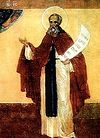

| Previous day | Next day |
| Old Style
February 13
|
Saturday |
New Style
February 26
|
| Commemoration of the Dead. Tone 2. | No fast.
|
Archbishop Seraphim (Sobolev) of Bogucharsk, Bulgaria (1950). ![]() St. Martinian, monk, of Caesarea in Palestine (5th c.), and Sts. Zoe of Bethlehem and the virgin Photina (5th c.).
St. Martinian, monk, of Caesarea in Palestine (5th c.), and Sts. Zoe of Bethlehem and the virgin Photina (5th c.).
St. Eulogius, patriarch of Alexandria (607-608). St. Symeon the Myrrh-gusher, prince of Serbia (1200). Synaxis of the Saints of Omsk. St. Joseph, founder of Volokolamsk (Volotsk) Monastery (1515). St. Seraphima (Euthymia in schema), abbess, of Sezenovo (1877).
New Hieromartyrs Leontius Grimalsky, archpriest, of Gzhel (Moscow) and Zosima Trubachev, archpriest, of Maloyaroslavets (1938).
Apostle Aquila of the Seventy, and St. Priscilla (1st c.) St. Timothy, archbishop of Alexandria (385). St. Castor of Karden, hieromonk and missionary (Germany) (ca. 400). St. Modomnoc, bishop of Ossory (Ireland) (6th c.).
Thoughts for Each Day of the Year
According to the Daily Church Readings from the Word of God
By St. Theophan the Recluse

Saturday (Commemoration of the Dead). [I Thess. 4:13–17; John 5:24–30]
Now the Holy Church directs our attention beyond the borders of our present life, to our fathers and brothers who have passed on from here. The Church hopes that by reminding us of their state (which we ourselves shall not escape), to prepare us to spend Cheese-fare week properly, as well as Great Lent which follows. Let us listen to our mother the Church; and commemorating our fathers and brothers, let us take care to prepare ourselves for our passing over to the other world. Let us bring to mind our sins and mourn them, setting out in the future to keep ourselves pure from any defilement. For nothing unclean will enter the Kingdom of God; and at the judgement, nobody unclean will be justified. After death you cannot expect purification. You will remain as you are when you cross over. You must prepare your cleansing here. Let us hurry, for who can predict how long one will live? Life could be cut off this very hour. How can we appear unclean in the other world? Through what eyes will we look at our fathers and brothers who will meet us? How will we answer their questions: “What is this badness in you? What is this? And what is this?” What shame will cover us! Let us hasten to set right all that is out of order, to arrive at least somewhat tolerable and bearable in the other world.
Articles
 Venerable Martinian of Caesarea, in PalestineSaint Martinian went to live in the wilderness at the age of eighteen, not far from the city of Caesarea in Palestine. |
 St. ZoeSaint Zoe remained on the island, where she spent six years in solitude, and then she gave up her soul to God. |
 St. PhotinaSaint Photina remained on the island, where she spent six years in solitude, and then she gave up her soul to God. |
 St. Eulogius the Archbishop of AlexandriaSaint Eulogius, Patriarch of Alexandria, was one of the enlightened hierarchs of the sixth century. |






